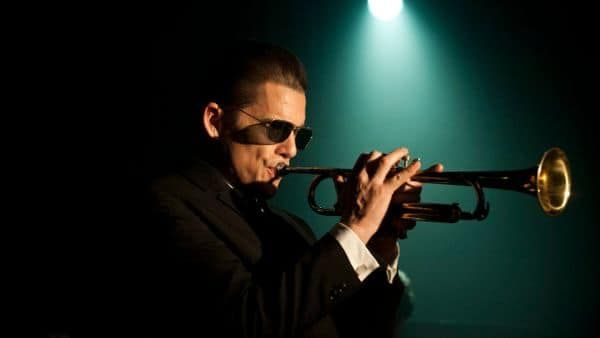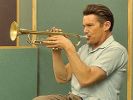Eye For Film >> Movies >> Born To Be Blue (2015) Film Review
Born To Be Blue
Reviewed by: Jennie Kermode

"Why do you take heroin?" Jane (Carmen Ejogo) asks Chet Baker (Ethan Hawke) at the outset of this film, as they tentatively embark on a romance. "It makes me happy," he says with a shrug. This is perhaps one of the most honest portrayals of addiction in film history, its bluntness sending a very different message from the patter of Trainspotting which, for all its brilliance, had more to say about how addicts see themselves than about how they are. Though much of Born To Be Blue follows Baker's attempts to live without heroin, it's never clear that he actually wants to. Framed by his melancholy music, this is a classic love triangle, depicting a man torn between a beautiful woman and the drug that first stole his heart. Hawke makes us believe it.
They have something in common, of course, the jazz legend and the actor: they're both comeback kids. After the early promise shown in the likes of Dead Poets Society, Hawke faded from the screen, and though he continued to appear in small roles and make an impression onstage, it wasn't until 2012's Sinister that he really started getting the film roles he deserved. This is the best of them. Though at a glance he doesn't look much like Baker except in his thinness, he captures every nuance of the way the trumpeter moved his face and body; it's mesmerising to watch. He also captures those distinctive vocals. But there's much more to this than an impression, as he immerses himself in his character and makes a man who was often inconsistent, brittle and difficult, utterly compelling.

The film opens with what was perhaps the defining disaster in Baker's life (though he had quite a string of them): the assault in 1966 that cost him his front teeth and his ability to play. Suddenly unable to express himself as he once did fluently, struggling with the unfamiliar currency of words, he is at his lowest ebb. Salvation comes in the form of Jane's affection, the loveless embrace of methadone and a parole officer who has dealt with musicians like him before. What follows is the long arc of a comeback, perhaps more dangerous should it succeed; and there are the myriad humiliations of begging for small opportunities from people who have no idea who they're dealing with.
Jane isn't real, of course: she's a composite of several woman who sacrificed themselves to the legend, and the resistance she puts up against this is like a composite goodbye. As a consistent character, she lets us focus more clearly on Baker and provides a foil during Hawke's more wayward moments. Ejogo gives her warmth, sensuality and much needed grit of her own. Importantly, for all that she endures and forgives, we never get the impression that she's getting nothing out of the arrangement. When Baker's father accuses him of singing like a girl we are reminded of that fragility and emotional openness few men dare to reveal; and limited though the musician's skillset is, he is fluent in the language of romance.
For a jazz biopic, this film is relatively light on performance, more interested in the background that gave this vain yet troubled white boy a right to sing the blues. It doesn't take us all the way, but most viewers will already know how the song ends.
Reviewed on: 25 Nov 2016

















